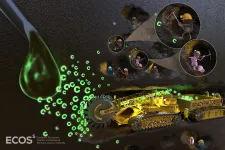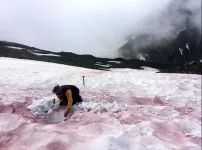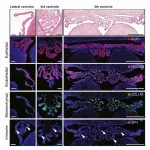(Press-News.org) The first double-blind experiment analysing the role of human decision-making in climate reconstructions has found that it can lead to substantially different results.
The experiment, designed and run by researchers from the University of Cambridge, had multiple research groups from around the world use the same raw tree-ring data to reconstruct temperature changes over the past 2,000 years.
While each of the reconstructions clearly showed that recent warming due to anthropogenic climate change is unprecedented in the past two thousand years, there were notable differences in variance, amplitude and sensitivity, which can be attributed to decisions made by the researchers who built the individual reconstructions.
Professor Ulf Büntgen from the University of Cambridge, who led the research, said that the results are "important for transparency and truth - we believe in our data, and we're being open about the decisions that any climate scientist has to make when building a reconstruction or model."
To improve the reliability of climate reconstructions, the researchers suggest that teams make multiple reconstructions at once so that they can be seen as an ensemble. The results are reported in the journal Nature Communications.
Information from tree rings is the main way that researchers reconstruct past climate conditions at annual resolutions: as distinctive as a fingerprint, the rings formed in trees outside the tropics are annually precise growth layers. Each ring can tell us something about what conditions were like in a particular growing season, and by combining data from many trees of different ages, scientists are able to reconstruct past climate conditions going back hundreds and even thousands of years.
Reconstructions of past climate conditions are useful as they can place current climate conditions or future projections in the context of past natural variability. The challenge with a climate reconstruction is that - absent a time machine - there is no way to confirm it is correct.
"While the information contained in tree rings remains constant, humans are the variables: they may use different techniques or choose a different subset of data to build their reconstruction," said Büntgen, who is based at Cambridge's Department of Geography, and is also affiliated with the CzechGlobe Centre in Brno, Czech Republic. "With any reconstruction, there's a question of uncertainty ranges: how certain you are about a certain result. A lot of work has gone into trying to quantify uncertainties in a statistical way, but what hasn't been studied is the role of decision-making.
"It's not the case that there is one single truth - every decision we make is subjective to a greater or lesser extent. Scientists aren't robots, and we don't want them to be, but it's important to learn where the decisions are made and how they affect the outcome."
Büntgen and his colleagues devised an experiment to test how decision-making affects climate reconstructions. They sent raw tree ring data to 15 research groups around the world and asked them to use it to develop the best possible large-scale climate reconstruction for summer temperatures in the Northern hemisphere over past 2000 years.
"Everything else was up to them - it may sound trivial, but this sort of experiment had never been done before," said Büntgen.
Each of the groups came up with a different reconstruction, based on the decisions they made along the way: the data they chose or the techniques they used. For example, one group may have used instrumental target data from June, July and August, while another may have only used the mean of July and August only.
The main differences in the reconstructions were those of amplitude in the data: exactly how warm was the Medieval warming period, or how much cooler a particular summer was after a large volcanic eruption.
Büntgen stresses that each of the reconstructions showed the same overall trends: there were periods of warming in the 3rd century, as well as between the 10th and 12th century; they all showed abrupt summer cooling following clusters of large volcanic eruptions in the 6th, 15th and 19th century; and they all showed that the recent warming since the 20th and 21st century is unprecedented in the past 2000 years.
"You think if you have the start with the same data, you will end up with the same result, but climate reconstruction doesn't work like that," said Büntgen. "All the reconstructions point in the same direction, and none of the results oppose one another, but there are differences, which must be attributed to decision-making."
So, how will we know whether to trust a particular climate reconstruction in future? In a time where experts are routinely challenged, or dismissed entirely, how can we be sure of what is true? One answer may be to note each point where a decision is made, consider the various options, and produce multiple reconstructions. This would of course mean more work for climate scientists, but it could be a valuable check to acknowledge how decisions affect outcomes.
Another way to make climate reconstructions more robust is for groups to collaborate and view all their reconstructions together, as an ensemble. "In almost any scientific field, you can point to a single study or result that tells you what to hear," he said. "But when you look at the body of scientific evidence, with all its nuances and uncertainties, you get a clearer overall picture."
INFORMATION:
NEW YORK, June 7, 2021--Recent studies suggest that new brain cells are being formed every day in response to injury, physical exercise, and mental stimulation. Glial cells, and in particular the ones called oligodendrocyte progenitors, are highly responsive to external signals and injuries. They can detect changes in the nervous system and form new myelin, which wraps around nerves and provides metabolic support and accurate transmission of electrical signals. As we age, however, less myelin is formed in response to external signals, and this progressive decline has been linked to the age-related cognitive and motor deficits detected in older people in the general population. Impaired ...
Just a few bacterial taxa found in ecosystems across the planet are responsible for more than half of carbon cycling in soils. These new findings, made by researchers at Northern Arizona University and published in END ...
In a white ocean, well above sea level, the algae thrive. Normally invisible to the naked eye, they are often spotted by hikers trekking through the mountains in late spring as strikingly coloured stretches of snow, in shades of ochre, orange and red. Known as "glacier blood", this colouring is the result of the punctual multiplication (or bloom) of the microalgae that inhabit the snow.
But apart from this impressive phenomenon, the life and organisation of mountain microalgae communities remains a secret. It is this still unknown ecosystem, now threatened by global warming, that needs to be explored. The ALPALGA* consortium aims to meet this challenge by organising and pooling research efforts on snow microalgae, and it has already received support from the Agence nationale ...
Mental health visits for new mothers were 30% higher during the COVID-19 pandemic than before the pandemic, particularly in the first 3 months after giving birth, found new research in CMAJ (Canadian Medical Association Journal). https://www.cmaj.ca/lookup/doi/10.1503/cmaj.210151
"Increased visit rates began in March 2020, although the state of emergency was declared only midway through the month, suggesting that distress related to the pandemic translated into an increased need for care very quickly," writes Dr. Simone Vigod, chief of psychiatry, senior scientist and interim vice president of academics at Women's College Hospital (WCH), and senior adjunct scientist at ...
New research indicates that patients hospitalized with active cancer were more likely to die from COVID-19 than those with a history of cancer or those without any cancer diagnosis. The findings published by END ...
A traditional Vietnamese meat snack could hold the key to developing a safe and natural food preservative, addressing the twin global problems of food waste and food-borne illnesses.
Key Points
Bacteria-killing compound discovered in Nem Chua, a fermented pork snack
Toxic to bacteria but safe for humans, it's a natural alternative to artificial food preservatives
New study reveals ideal growth conditions to potentially make the bacteria-killer at industrial scales
The fermented pork snack, Nem Chua, is eaten raw but does not cause food poisoning when prepared correctly.
This is because friendly bacteria that thrive in the fermented meat make a special compound that destroys more dangerous bacteria.
Now ...
Once viewed merely as a producer of the cerebrospinal fluid (CSF) bathing the brain and spinal cord, the choroid plexus is now known to be a key player in brain development and immunity. These fronds of brain tissue, located in the CSF-filled brain cavities known as ventricles, secrete instructive cues into the CSF to regulate brain development. They also function as an important barrier between the brain and the rest of the body.
Maria Lehtinen, PhD, of Boston Children's Hospital has done much of the pioneering work in understanding this once-obscure tissue. In new work published in Cell, Lehtinen, Neil Dani, PhD, and other colleagues at Boston Children's and the Broad Institute created ...
The friendship paradox is the observation that the degrees of the neighbors of a node within any network will, on average, be greater than the degree of the node itself. In other words: your friends probably have more friends than you do.
While the standard framing of the friendship paradox is essentially about averages, significant variations occur too.
In the Journal of Complex Networks, Santa Fe Institute and University of Michigan researchers George Cantwell, Alec Kirkley, and Mark Newman address this by developing the mathematical theory ...
Carried like stowaways in the guts of international travelers, new and potentially deadly strains of antimicrobial resistant superbugs may be coming to a community near you, suggests new research from Washington University School of Medicine in St. Louis.
"Even before the COVID-19 pandemic, we knew that international travel was contributing to the rapid global increase and spread of antimicrobial resistance," said Alaric D'Souza, an MD/PhD student at Washington University and a co-first author of the study to be published June 6 in Genome Medicine. "But what's new here is that we've found numerous completely novel genes associated with antimicrobial ...
Climate experts warn that, without urgent action, climate change will continue to cause an increase in the intensity of extreme rainfall that can lead to severe flooding.
An international research team have concluded that increases in extreme rainfall and associated flooding are projected to continue as global temperatures continue to rise. Efforts to limit warming to +1.5C will help limit changes in extreme rainfall, though some societal adaptations will still be required.
Sharing their findings in a new ScienceBrief Review, published today (7 June), scientists ...



